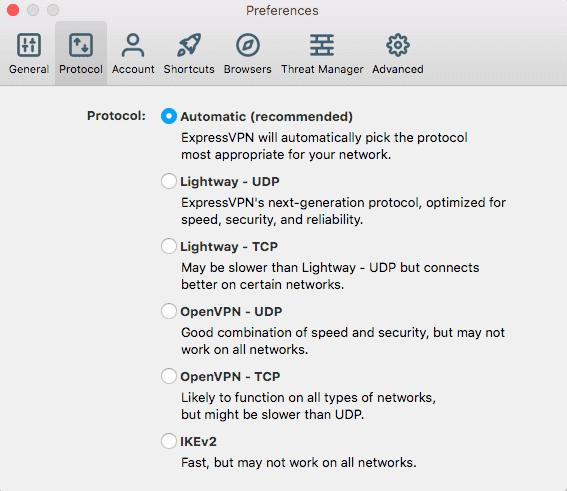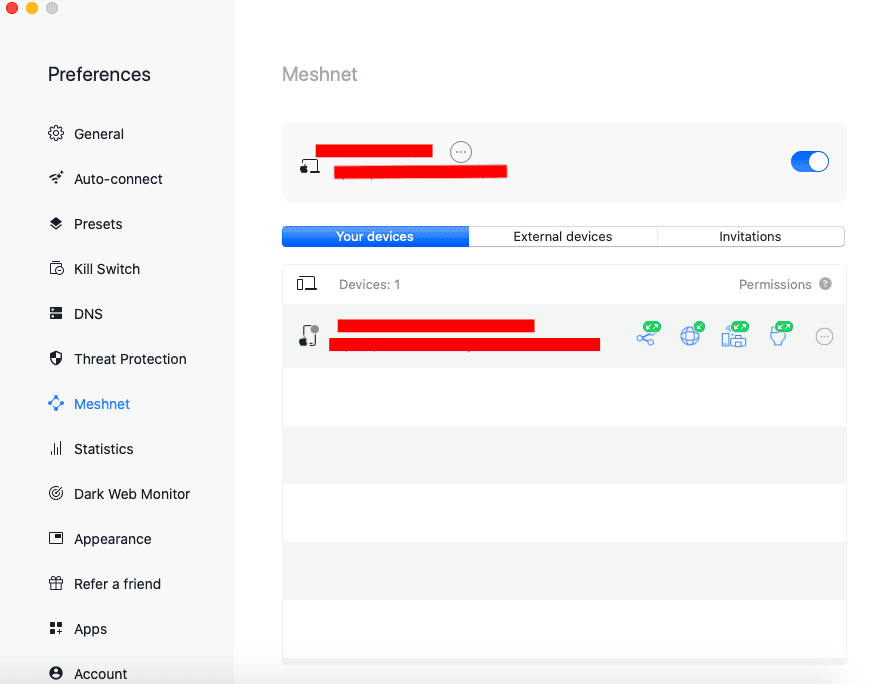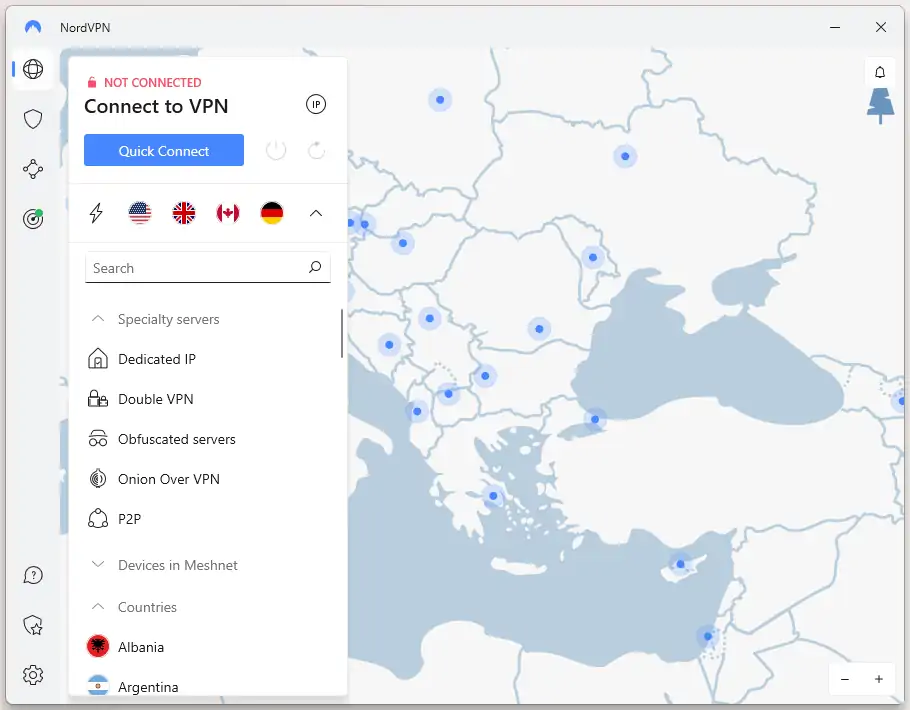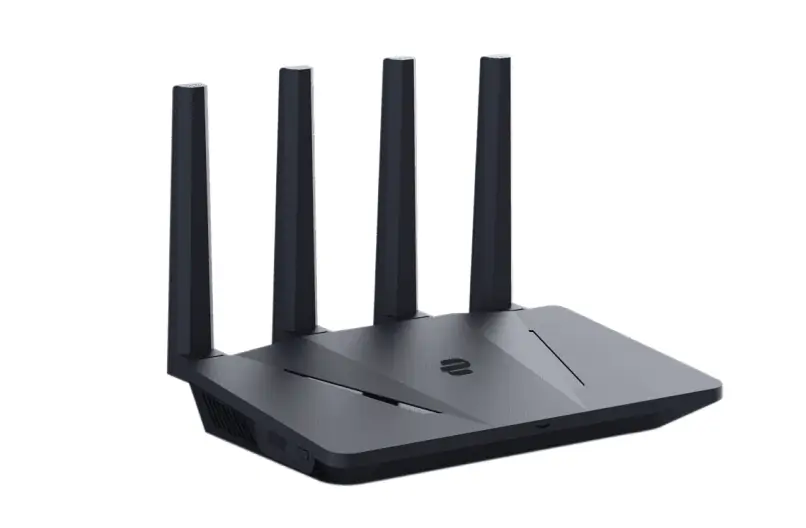ExpressVPN and NordVPN are two of the most popular and widely used VPN services. Both claim to be super fast and secure. In this ExpressVPN vs NordVPN comparison, we settle the debate and show you which is better.
We’ll walk you through the points that both VPNs share, then examine the key factors that distinguish them. By the end, you’ll have all the information you need to make the final call.
ExpressVPN vs NordVPN: Differences
This section explains where NordVPN and ExpressVPN differ. Some sections describe a feature found on one VPN but not the other, while others refer to a shared goal that both services approach in different ways.
(Click The Title To See Details)
Exclusive Protocols – Tie
Although both VPN services come with VPN protocols that you can’t find anywhere else, these proprietary protocols do differ in nature. NordVPN includes NordLynx, which is essentially the WireGuard protocol with extra steps to counter its one weakness — the need to temporarily log users IP addresses.

On the other hand, ExpressVPN Lightway is an entirely new protocol created from the ground up. Each of these protocols is very fast, and both are mostly open-source. However, if you want to use WireGuard specifically for your VPN connections, choose NordVPN and do it through NordLynx.
Meshnet – One of NordVPN’s biggest advantages
One of NordVPN’s biggest advantages over ExpressVPN (and all other competitors) is the free-to-use software called NordVPN Meshnet. Meshnet can form a secure tunnel between your device and any other device with NordVPN installed. The process is automatic if you own the second device, and all it takes is a simple friend request if someone else owns it.

The applications for this feature are nearly endless. Meshnet can share files between devices without needing third-party cloud storage. You can use one of your own devices as a VPN server to access sites from your home country while traveling, or set up a protected gaming server to play Minecraft or Stardew Valley with friends around the world.
Double VPN Servers – NordVPN Exclusive Features
A double VPN connection is a nice precaution when you’re doing something online that could be dangerous if exposed. The double VPN sends your requests through two servers instead of one before moving them on to your internet service provider (ISP). On the off chance that one server is faulty, the other one can still protect you.

ExpressVPN doesn’t have double VPN servers. NordVPN has them in nine countries, but you can’t toggle where the intermediary connection is, so be prepared to trade a bit of speed in exchange for your online security.
Router Installation
Installing a router VPN has two main benefits. First, any device that connects through a VPN router gets protected with encryption, making simultaneous connection limits irrelevant. Second, devices that don’t support VPN apps can still use a VPN tunnel via a router.

Both VPNs can be installed on routers, but ExpressVPN gains an advantage with ExpressVPN Aircove. This router comes preinstalled with ExpressVPN and includes a dashboard that lets you change which server the router uses to connect. You can even make different devices on the router connect to different places.
You can also install NordVPN on a router, but it’s a more time-consuming process. You’ll need to get a router with compatible firmware, download a NordVPN configuration and install it on the router control panel.
Dedicated IP Address Availability – NordVPN Exclusive Features
A dedicated IP address is an IP address that never changes — every time you connect to the VPN, it’ll be the same. These are useful for websites that may be suspicious of VPNs. NordVPN offers dedicated IP addresses in 24 countries, all of which are personal to each customer (as opposed to static IP addresses that may be shared).
ExpressVPN doesn’t provide dedicated or static IP addresses. A page on its website reveals that the company is working on a way to offer them with complete anonymity, but it hasn’t rolled out this feature yet.
Split Tunneling Platforms – NordVPN is Better
Split tunneling is a VPN feature that sends some internet traffic through a VPN server while other traffic goes unprotected. If you’re trying to get on a site that auto-blocks VPNs, or if you need to improve speeds temporarily for a non-sensitive activity, it can be helpful. ExpressVPN and NordVPN both have split tunneling, but not on all platforms.
NordVPN offers split tunneling on its Windows and Android apps only, including Android TV. ExpressVPN limits it even more — you can find it only on Windows, plus macOS 10 and below.
Simultaneous Connections – 8 vs 10
The number of simultaneous connections is the limit for how many devices you can connect through a single VPN account at once. ExpressVPN allows 8 simultaneous connections on all plans, while NordVPN surpasses it by offering 10.
Pricing & Best Plan – NordVPN is More Cheaper
One of the biggest reasons to choose NordVPN over ExpressVPN is that ExpressVPN is more expensive in almost every case; arguably, it’s overpriced, though it’s not the costliest VPN of all.
Both VPNs cost about the same for one month at a time: $12.95 for ExpressVPN and $12.99 for NordVPN. After that, things diverge. One year of ExpressVPN costs $6.66 per month, compared to $4.99 per month for NordVPN — even NordVPN’s Ultimate plan is slightly cheaper, coming in at $7.99 per month for a year.
NordVPN also has a two-year plan, where the Basic VPN service goes for just $3.09 per month. However, in ExpressVPN’s defense, it does have a six-month plan costing $9.99 per month, so it offers a little convenience that NordVPN doesn’t provide.
Try risk-free: 30-day Money-Back Guarantee